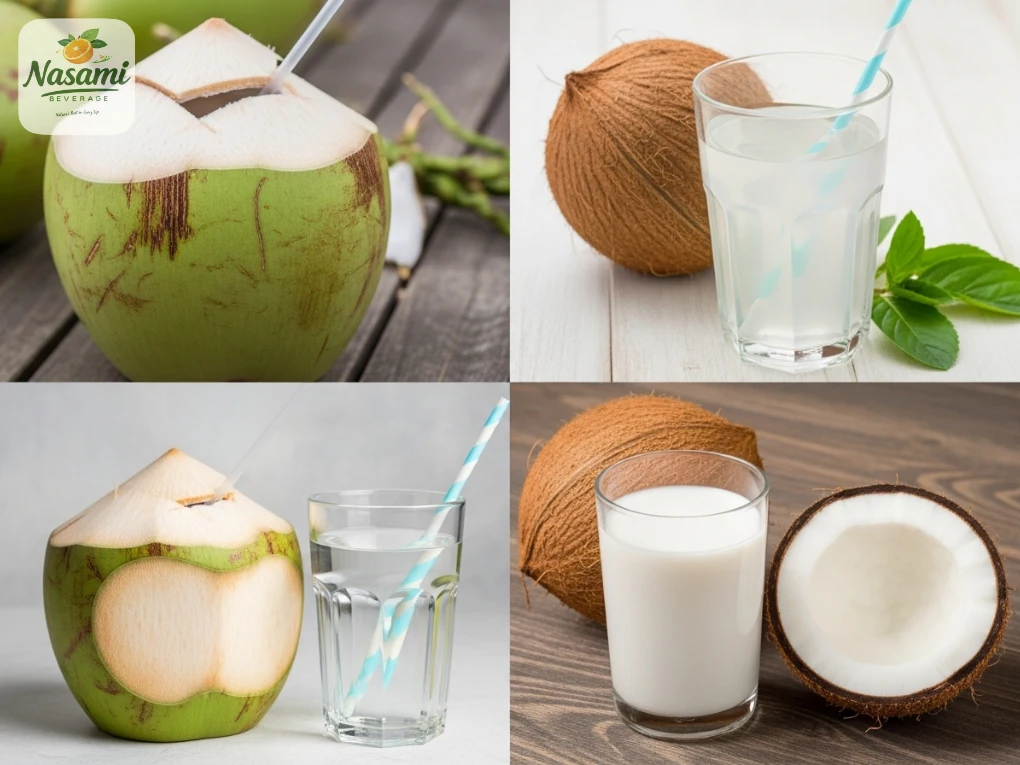Why we should not drink coconut water at night? Coconut water has surged in popularity as a natural hydration drink, praised for its electrolytes and refreshing taste. However, consuming it at night may pose health risks, from disrupting sleep to affecting blood sugar or digestion. This article explores why drinking coconut water before bed could be problematic, identifies who should exercise caution, and highlights safer hydration alternatives. Backed by science and expert insights, it offers practical tips to enjoy coconut water responsibly while optimizing your nighttime wellness routine. As Hippocrates wisely said, Let food be thy medicine and medicine be thy food, emphasizing the importance of mindful consumption.
The coconut water craze: A nighttime concern?
Coconut water, often marketed as nature’s sports drink, is celebrated for its hydrating properties and nutrient profile. Brands like Vita Coco and Harmless Harvest have made it a staple for fitness enthusiasts and health-conscious individuals.
Yet, recent discussions highlight potential downsides to drinking it at night. Concerns range from its high potassium content to its impact on digestion and sleep quality. Understanding these risks empowers readers to make informed choices about when and how to enjoy this tropical beverage.
Why coconut water might disrupt your night
Consuming coconut water at night may lead to unexpected health challenges. Its nutrient composition, while beneficial during the day, can interfere with bodily functions when consumed before bed. Below, we delve into the specific risks associated with nighttime intake.
High potassium and hyperkalemia risks
Coconut water is rich in potassium, a vital electrolyte for muscle function and hydration. A single cup contains approximately 600 mg of potassium, comparable to a banana. However, excessive potassium intake, especially for those with compromised kidney function, can lead to hyperkalemia, a condition where blood potassium levels become dangerously high.
Symptoms include irregular heartbeats and muscle weakness. A notable case involved a tennis player who experienced hyperkalemia after consuming large amounts of coconut water post-match, highlighting the need for moderation. To ensure safety, learn how to know if coconut water is bad to avoid consuming spoiled products.
Blood sugar spikes for diabetics
For individuals managing diabetes, coconut water’s natural sugars pose a concern. Each cup contains about 6–8 grams of sugar, which can elevate blood glucose levels, particularly at night when insulin sensitivity may be lower.
Studies suggest that consuming sugary beverages before bed can disrupt glycemic control, increasing the risk of nighttime hyperglycemia. Diabetics should prioritize low-sugar hydration options to maintain stable blood sugar levels during sleep. For more details, check the gi index of coconut water to understand its impact on blood sugar.
Digestive Issues and FODMAPs
Coconut water contains FODMAPs, fermentable carbohydrates that may trigger digestive discomfort in sensitive individuals. These compounds can lead to bloating, gas, or diarrhea, especially when consumed in large quantities.
Its mild laxative effect, driven by potassium and magnesium, may exacerbate these issues at night, leading to restless sleep or frequent bathroom trips. Those with irritable bowel syndrome or similar conditions should be particularly cautious.
Potential sleep disruption
The diuretic properties of coconut water, attributed to its potassium and magnesium content, can increase urine production. Drinking it close to bedtime may result in frequent nighttime awakenings for urination, disrupting sleep cycles.
Nutritionist Melissa Hooper notes that excessive fluid intake before bed, especially from diuretic beverages, can hinder restful sleep, leaving individuals fatigued the next day. For optimal sleep hygiene, hydration timing is critical.
Specific groups at risk
Certain populations face heightened risks from drinking coconut water at night. Understanding these vulnerabilities helps tailor consumption habits to individual health needs.
People with kidney problems
Individuals with kidney disease or reduced kidney function must monitor potassium intake closely. Healthy kidneys regulate potassium levels, but impaired kidneys struggle to excrete excess, increasing hyperkalemia risk. Medical experts recommend that those with chronic kidney disease consult healthcare providers before incorporating coconut water into their diets, especially at night when metabolic processes slow.
Individuals with diabetes
Beyond blood sugar concerns, diabetics may face challenges with coconut water’s carbohydrate content. Nighttime consumption can disrupt glucose monitoring routines, complicating diabetes management. Opting for water or unsweetened herbal teas at night supports better glycemic control and reduces the risk of complications.
Those on blood pressure medications
Coconut water’s potassium can interact with certain blood pressure medications, such as ACE inhibitors or potassium-sparing diuretics. These drugs already elevate potassium levels, and additional intake from coconut water may tip the balance toward hyperkalemia. Patients on these medications should seek medical advice to determine safe consumption levels.
When is coconut water bbeneficial?
Despite its nighttime risks, coconut water remains a valuable hydration option when consumed appropriately. Its benefits shine in specific contexts, provided intake is moderated.
Daytime hydration and exercise recovery
Coconut water excels as a post-workout rehydration drink, thanks to its electrolytes, including potassium, magnesium, and sodium. It replenishes fluids lost during exercise, making it a favorite among athletes. Brands like Zico and C2O Pure Coconut Water offer pure formulations ideal for morning or afternoon recovery, supporting muscle function and energy restoration without overloading the system.
For a tasty twist, try smoothie recipes using coconut water to enhance your post-workout nutrition.
Nutritional value
Beyond hydration, coconut water provides essential nutrients. It contains antioxidants, vitamin C, and trace minerals like calcium, contributing to overall wellness. When consumed in moderation, typically one to two cups daily, it supports heart health and immune function.
Choosing unsweetened varieties, such as Taste Nirvana, ensures maximum benefits without added sugars.
Safer nighttime hydration options
To avoid the risks of coconut water at night, consider these alternatives that promote restful sleep and stable health metrics.
Plain water
Water remains the gold standard for nighttime hydration. It is calorie-free, sugar-free, and devoid of diuretics, making it ideal for maintaining hydration without disrupting sleep or digestion. Keeping a glass of water by the bedside ensures easy access for nighttime sips.
Herbal teas
Herbal teas, such as chamomile or peppermint, offer calming effects that enhance sleep quality. Chamomile, in particular, contains apigenin, an antioxidant linked to reduced anxiety and better rest. These teas are low in potassium and FODMAPs, making them suitable for sensitive digestive systems.
Low-Potassium electrolyte drinks
For those needing electrolytes without potassium overload, low-potassium options like certain sports drinks or homemade solutions work well. Diluting a small amount of electrolyte powder in water provides hydration benefits without the risks associated with coconut water’s nutrient profile.
How to enjoy coconut water safely
With mindful practices, coconut water can be part of a healthy diet. The key lies in timing, portion control, and product selection.
Timing matters
Consume coconut water during the day, ideally in the morning or after physical activity. This timing leverages its hydrating and energizing properties while minimizing nighttime disruptions. Avoid drinking it within two hours of bedtime to reduce diuretic effects.
Portion control
Limit intake to one to two cups daily to balance benefits and risks. Overconsumption, even during the day, can lead to excessive potassium or sugar intake. Measuring portions with a standard cup size helps maintain consistency.
Choosing the right product
Select unsweetened, additive-free coconut water to avoid hidden sugars or artificial ingredients. Brands like Harmless Harvest prioritize organic, pure formulations, ensuring quality and safety. Check labels for sodium content, as some brands add salt for flavor, which may affect blood pressure.
Frequently Asked Questions
Can drinking coconut water at night cause digestive issues? Yes, coconut water’s FODMAPs and laxative properties, driven by potassium and magnesium, may lead to bloating, gas, or diarrhea, especially in sensitive individuals or when consumed in excess.
Is coconut water safe for people with diabetes at night? Coconut water’s natural sugars can spike blood glucose, particularly at night. Diabetics should opt for low-sugar alternatives like water to maintain stable glucose levels.
What are the best alternatives to coconut water at night? Plain water and herbal teas like chamomile or peppermint are excellent choices. They hydrate without affecting sleep, digestion, or blood sugar.
How much coconut water is safe to drink daily? One to two cups daily is generally safe for healthy individuals. Those with kidney issues or diabetes should consult a doctor to determine appropriate limits.
Drinking coconut water at night may seem harmless, but its high potassium, natural sugars, and diuretic properties can disrupt sleep, digestion, and health for certain individuals. Those with kidney issues, diabetes, or specific medication regimens should exercise particular caution.
By opting for daytime consumption and exploring alternatives like plain water or herbal teas, you can stay hydrated without compromising wellness. For premium coconut water products and expert health tips, visit Nasami Beverage.
Consult a healthcare provider for personalized guidance, and subscribe to our newsletter for more science-backed health insights.



